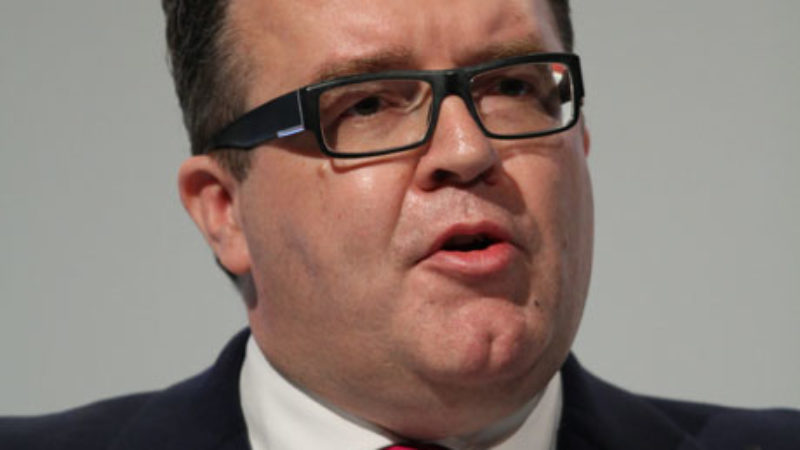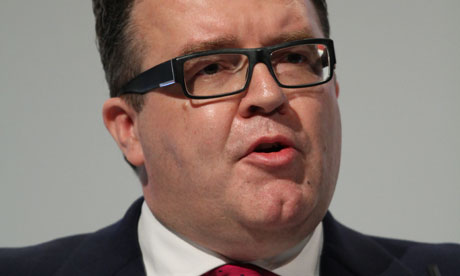
The politics of organisation matter. A lot.
Labour is to carry out a review of what went right and wrong at the election. It’s vital we do this in order that our new leader, whoever she or he is, can set our policy objectives for the next decade.
I’m seeking the deputy leadership to do one thing: write and execute the election battle plan so that our new leader will be Prime Minister.
I’m not underestimating the scale of the task but our ambition should be to win back power in 2020 and we only have 1819 days to do it. The politics of organisation are central to the existential debate that’s now taking place in the party.
It’s hard being a political veteran at the age of 48. Yet in recent months, as I visited 109 constituencies in the run up to polling day, it’s what I reluctantly concluded that I’ve become. My hair is going grey, my feet ache more after canvassing, I look forward to bed straight after Newsnight.

During the election, I had more early nights in more Premier Inns than Lenny Henry. And though I know it’s the most dangerous emotion in politics, I get nostalgic. I found time to remember my first general election in February 1974. I collected numbers on a pink reading pads at the polling station at Franche First school, Kidderminster. At only 7 years old, some may describe this task as an act of parental neglect, but in those days, politics was more civil. The kindly lady in the blue rosette looked after me while the young women and men wearing red ferried voters to and from the school.
And on the campaign trail, seeing thousands of Labour party members at open air rallies, fundraisers and on the doorsteps took me back to the excitement of the mid-nineties, under the leadership of Tony Blair. I shared an office with Phil Wilson, who told me about the “Sedgefield barbeque” model of membership recruitment. 1800 people in a pilot scheme of discounted membership (a pound if I recall) based around social, not just political events.
We spent hours and hours bouncing ideas around, in a creative process which understood that change under Blair knew few borders.
Before Tony’s election, under John Smith and Neil Kinnock, I helped rebuild the party’s youth section – Young Labour. It took painful hours of internal meetings to convince a leadership scarred by the memory of the Labour Party Young Socialists that this was an essential component in our future success.
A group of young activists produced their own colour magazine, “Re:generation”, but we didn’t have the budget to send it to young members. So I sneaked enveloped copies of the magazine into all the office out-trays of our Walworth Road HQ, twice a day, for weeks on end, until all 16,000 young members had received a copy. Some of the early members of Young Labour now sit in the Shadow Cabinet. You see what I mean about being a veteran? And now the next but one generation of Labour Cabinet Ministers need to be engaged as never before.
My point? The politics of organisation matter. A lot. That’s the bit of the election post-mortem I’m most interested in.
Our leadership candidates will set out their stalls, explain how they will appeal to the country, and offer an assessment of what went right and wrong with policy.
I want to make sure we don’t lose what went wrong with our campaigns and election organisation.
It’s too early to get the whole picture but I know where it begins – with our losing candidates, especially in key seats. I met nearly all of them during the campaign and I’m going to meet them again over the coming weeks.
Why is this important? MPs talk a lot about what voters tell them on the doorstep. A single key seat candidate has talked to more voters on more doorsteps than every member of the shadow cabinet combined. They have to be the starting point of our post-election analysis.
There are some fundamental questions I want to ask them. Did the five million conversations work? I want to understand if we significantly distinguished between ‘contact’ and ‘engagement’. When I visited Redcar I was struck by how many of our council candidates were new to the party, and had a strong relationship with Anna Turley our successful candidate. They led their communities – from Redcar in bloom to neighbourhood watch. Relationships matter. And we needed better relationships with the working people of Britain last Thursday. We would have seen this defeat coming if we’d had them.
More fundamental is the difference between mobilisation and organisation. Did we get into the weave of our communities? I have read ‘All politics is local’ by Tip O’Neil 50 times over. During the last Parliament, the Tories allowed 2000 bus routes to be cut. I couldn’t understand where all the local campaigns to save the number 57 were. Labour pledged to give local authorities new powers like they have in London which dictates to operators where and when the busses will run. Were our key seat campaigns decentralised enough? Were our organisers empowered to take decisions on message, were they given the encouragement to fight on issues unique to the circumstances in their area?
In this respect, were our councillors, most of whom really know what’s going on in their communities, given sufficient involvement in the campaign planning process? I have a hunch it was a mixed picture. One thing is for certain, though – local government is where we have to start to rebuild our base.
We need Labour councillors more than we have ever done before.
Our councillors are not just foot soldiers. They deserve our greatest respect. They see first hand how policies should be constructed to work effectively for local communities so they should be integral to policy development.
Labour councillors must also be the very best trained community organisers in the country. The party machine must see itself as working for them, not as it often appears, them working for the party machine.
While I’m still in nostalgic mood, let me take you back to 1987. I remember standing on the steps of Walworth Road the day after we lost the general election. That was the last time we were supposed to have run the best election campaign but lost the actual election. You can see me holding back the tears, standing next to Neil Kinnock in this video clip.
I don’t want to be holding back the tears again. I hate losing elections and I want you to win.
With 41 years since working in my first general election, I have some ideas about what it takes.
I’m very clear. A new leader will need a campaigning deputy more than ever. If you want to help me – please sign up here.
Tom Watson is the Labour MP for West Bromwich East




More from LabourList
Delivering in Government: your weekly round up of good news Labour stories
‘Forgotten fathers: pipefitters, plumbers and the paternity pay gap’
‘How can Britain build peace for Palestinians without owning its own past?’